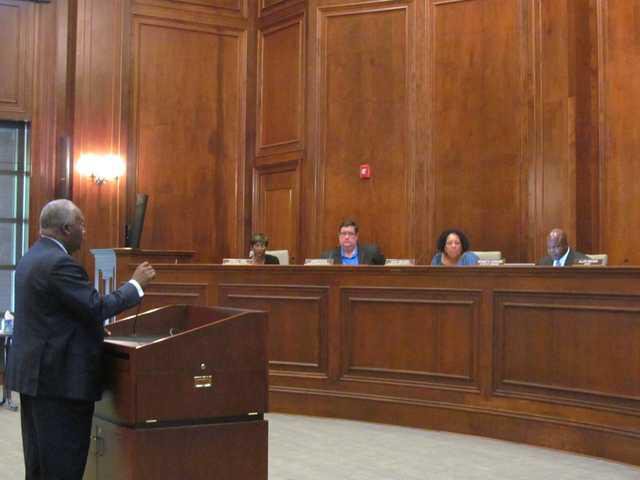Former Hinesville City Manager Billy Edwards will remain, at least on paper, a city employee until Sept. 12.
This is the official date Edwards’ resignation will become effective, according to the severance agreement received by the Coastal Courier through an open records request. Edwards also agreed not to sue the city.
The agreement acknowledges that the long-time city manager “was not terminated for cause,” and that his resignation will be noted in the city’s personnel records as being voluntary.
The Hinesville City Council accepted a negotiated severance package for Edwards on Aug. 17, after reconvening into regular session following an executive session in which they discussed personnel. The council then appointed acting City Manager Ken Howard as interim city manager.
The severance agreement details the salary and benefits the city will pay Edwards on the day his resignation becomes official.
This includes the two-weeks of wages Edwards did not receive during his 14-day suspension in June. The city is obligated to pay Edwards the nine months of salary he would have earned after Sept. 12. This amount will be paid in two installments; $30,000 on Sept. 12, and $86,347.73 on Jan. 2, 2018.
Edwards notified the city on June 5 of his intent to sue. He began his employment with the City of Hinesville on June 12, 1978.
During the council’s Aug. 17 meeting all five council members voted to release Edwards after reconvening from an executive session in which they discussed personnel.
Background
Edwards was suspended for two weeks without pay on June 1 by a 3-1 vote of council members Diana Reid, Vicky Nelson and Keith Jenkins, after Mayor Allen Brown reportedly adjourned and walked out of an executive session.
Those three Council members voted for Edwards’ suspension in open session following the closed meeting. Councilman Jason Floyd voted against the measure and Kenneth Shaw, serving as mayor pro tem following Brown’s exit, did not vote, according to Hinesville’s PR manager, Brittany Denney.
No reason has been given for Edward’s suspension, and he maintained he hadn’t been told why he was suspended. He “was not afforded the barest of due process,” according to letters to the city from his attorney.
During a July 20 meeting, Reid, of District 1, requested to “have the City Attorney draft an amendment” to clarify language in the city ordinance regarding the “appointment and removal of the City Manager,” according to the city’s meeting workbook available on its website.
During the Aug. 3 meeting, the City Council decided to further discuss amending a section of city code regarding the appointment and removal of its city manager. Floyd, representing District 2, suggested the council hold a workshop prior to the next meeting before voting on the proposed amendment.
The proposed change to city code Section 2-282 regarding the appointment of a city manager would effectively remove the mayor from any such vote for appointment, and leave the decision with a majority of the city council only.
The proposed change to section 2-286 dealing with removal of a city manager, if approved, would read, “The City Manager may be removed by a majority vote of the City Council for good cause at any time.” Again, the word “Mayor” was red-lined in the draft ordinance.
Reid asked City Attorney Linnie Darden to further clarify the meaning of the words “good cause” in the draft for an amended ordinance. Reid had accused Edwards of insubordination for not replying to an email in a timely fashion.
The workshop was held Aug. 17 prior to the regular meeting.
Council members discussed Section 2-282 which deals with the appointment of a city manager, and Section 2-286 which deals with removal of a city manager. Several council members had called for clarification of the ordinance’s language, proposing the ordinance accurately reflect that a majority vote of council members was enough to remove a city manager without also needing the mayor’s vote. The original wording of the ordinance reads, “The Mayor and City Council may remove the City Manager for good cause at any time by a majority vote of its members.”
Floyd said he spoke with two former Hinesville mayors, Jim Thomas and Thomas Ratcliffe, to hear how they interpreted the ordinance. Floyd said from his research he concluded that the mayor’s vote would not override the council, “but by giving him a vote you give him a voice.” Floyd was opposed to amending the ordinance.
Jenkins said he also researched the matter, speaking to Brunswick city officials and Thomas. Jenkins said a mayor should have strong input in recommending the selection or removal of a city manager, but that a majority vote of council members should determine a city manager’s hiring or firing.
Thomas was asked by council members to offer his interpretation of the ordinance. Thomas likened the mayor to the CEO of a company, and the council to a board of directors. He said the mayor’s role was to work with the advice and consent of the council. “The mayor, essentially, doesn’t vote except in the case of a tie,” he said. Thomas added that the city manager should report to one person - namely the mayor – in order to avoid confusion.
Immediately after the workshop the regular meeting was held and Edwards resigned, accepting the negotiated severance package and agreeing not sue.
Edwards, city reach agreement


Sign up for our e-newsletters